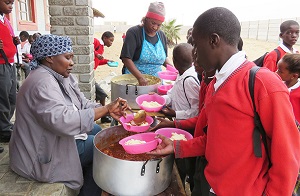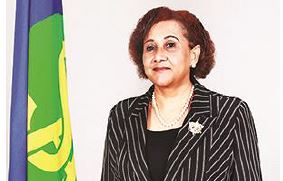
Geingob’s response to poverty and hunger crises not ideal

By BIG Coalition of Namibia.
The President, HE Dr. Hage Geingob’s plan of converting the Food Bank and Special Feeding Schemes as the first step towards phasing in Basic Income Grant (BIG) is not the ideal way of dealing with widespread poverty that has reached a humanitarian crisis.
Recent findings by the World Bank reveal that 64% of Namibians live in poverty. Namibia has the second-highest unemployment rate in the world, with 50% youth unemployment. The 2020 UN Global Report on Food Crisis says 800,000 Namibians are facing starvation of which 400,000 are in need of humanitarian aid.
The conversion of the food bank and special feeding schemes into BIG will only benefit 42,000 people. Not all vulnerable, deserving and intended beneficiaries will be covered.
It is against the background of the magnitude of poverty in our country that the BIG Coalition deems it absolutely essential that an unconditional BIG programme of at least N$500/person/month for people aged 19 to 59, be legislated and implemented.
This is the best way to ensure that all vulnerable, deserving, and intended beneficiaries are covered. Many people have lost their jobs, and the informal sector which employs 52% of the Namibian people was the hardest hit as a result of the COVID-19 pandemic lockdowns.
The fact that a lot of people have committed suicide between January 2020 and June 2021, as reported recently by a local paper, is a sign of people in distress. Financial stress is the main cause of suicide in Namibia. And the government only wants to help a handful of people while the widespread suffering is clearly evident? What will happen to the rest of the Namibians who are struggling to survive on a daily basis? Is the government inhumanely going to stand by and watch the rest of the Namibians suffer while struggling to survive? The conversion goes against the president’s promise of eradicating poverty and his promise of “nobody in the Namibian house should be left out” as it will not benefit many poor Namibians.
When President Geingob says the conversation is the first step towards phasing in BIG, does he mean that it will at some stage be implemented to cover all Namibians who are struggling to survive? He hasn’t given a figure of how much recipients will be receiving. That only means that the President’s plans are not well thought out.
The President speaks about responding to the expected 4.2% increase in poverty. We do not know where he got that figure from. We have looked through the report that he says he got the figure from but we were not able to find such a figure anywhere in the report.
The President says the government ‘has responded’ to increasing poverty. We don’t know how it has responded to the crises when the Harambee Prosperity Plan 2 states that the conversion of the Foodbank and Special Feeding Scheme into BIG will only take place in 2022. People are starving and in urgent need of state assistance and cannot wait until 2022. And the United Nations has recommended that an urgent BIG be implemented, at least temporarily, to help the poor cope with the COVID-19 pandemic’s impact on their livelihoods and encourage people to stay at home to curb the spread of the virus.
On the other hand, it is a good thing that the Foodbank will be converted to BIG even if it is a pity that it will not cover all the people in need of assistance. It is best to give people cash to decide for themselves what they need the most. People have been strategically selling Foodbank/Harembee food in order to get money for other urgent matters e.g., school-related expenses, transport, hygiene products, etc, The BIG should be implemented in a similar way as with the Old Age Pension which has worked well in terms of ease to access and reducing the daily struggle for survival for pensioners. The Emergency Income Grant (EIG) has shown us that implementing social protection programmes is not a complicated matter.













































